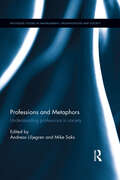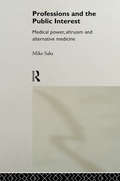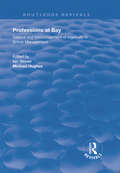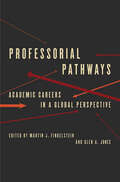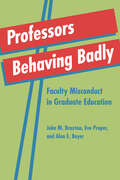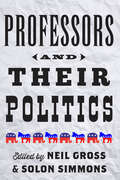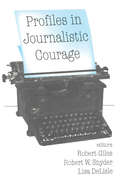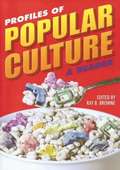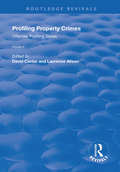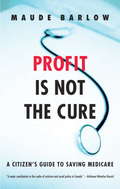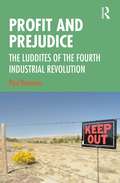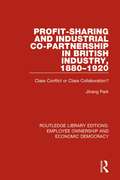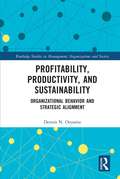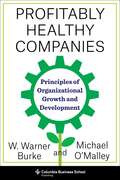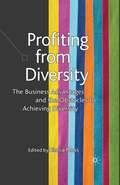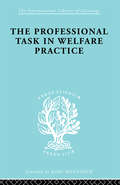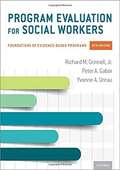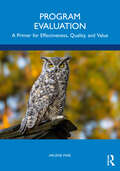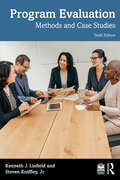- Table View
- List View
Professionelles Handeln Pflegelehrender angesichts ethischer Herausforderungen
by Anne-Christin LindeDie Pflegebildung unterliegt aktuell vielfältigen Veränderungen und wachsenden Anforderungen. Lernende in der Pflegeausbildung sind zunehmend heterogen hinsichtlich ihrer Bildungsbiografien. Die Bedingungen in der praktischen Pflegeausbildung sind vermehrt geprägt durch Arbeitsverdichtung bei gleichzeitig komplexer werdenden Pflegesituationen. Professionelles Handeln bedarf gerade angesichts dieser konstitutiven und aktuellen Anforderungen einer Verantwortungsübernahme durch Pflegelehrende sowie ermöglichende Rahmenbedingungen. Professionell zu handeln bedeutet auch, situativ im Einzelfall ethisch begründete Entscheidungen zu treffen. Hierfür bedarf es einer ethischen Orientierung in Form einer Berufsethik. Für die Entwicklung einer Berufsethik Pflegelehrender muss mehr über deren ethische Herausforderungen in Erfahrung gebracht werden. Das vorliegende Buch beschreibt ethische Herausforderungen Pflegelehrender, um einen professionellen Umgang damit zu befördern.
Professions and Metaphors: Understanding professions in society (Routledge Studies in Management, Organizations and Society)
by Mike Saks Andreas LiljegrenProfessions and Metaphors: Understanding Professions in Society explores the way that two traditions have contributed to our understanding of both theory and society over recent decades. In the first tradition, the growing literature on metaphors has helped to guide thinking, providing insights into such phenomena as the study of organizations. In the second, there has been an increased interest in professions, from lawyers and university academics to doctors and social workers. This edited collection brings together these two traditions for the first time, providing a unique and systematic overview, at macro and micro level, of the use of metaphors in the sociology of professions. A range of professional fields are explored, from law and medicine to social work and teaching, showing how metaphors can enhance our understanding of the operation of professional groups. By demonstrating how metaphors can add to our understanding of professions in society, as well as in professional practice, this ground-breaking book makes an invaluable contribution to advanced students and researchers in fields such as the sociology of professions and work and organization – as well as informing professionals and policy makers themselves.
Professions and Patriarchy (International Library of Sociology)
by Anne WitzThis impressive and original study is one of the first books to combine mainstream sociology with feminism in exploring the subject of the professions and power.This is an important addition to the corpus of feminist scholarship... It provides fresh insights into the way in which male power has been used to limit the employment aspirations of women in the middle classes. - Rosemary Crompton, University of Kent
Professions and Power (Routledge Revivals)
by Terence J. JohnsonFirst published in 1972, this book rejects as inadequate the ‘trait’ and ‘functionalist’ theories of the professions and instead presents an alternative framework to analyse the contemporaneous occupational change in industrial societies. The author describes how occupational specialisation creates varying degrees of social distance between producers and consumers of goods or services, thus several institutions of control social have developed — collegiate, corporate or oligarchic patronage, mediative. The author looks at the social conditions necessary for the development of these methods of control and the apparent decline of professionalism in both developed and undeveloped societies.
Professions and Professional Service Firms: Private and Public Sector Enterprises in the Global Economy (Routledge Advances in Management and Business Studies)
by Mike Saks Daniel MuzioProfessions are increasingly linked with enterprise at a number of interrelated levels. By considering the relationship of professions to the enterprise contexts in which they work, this book reveals the dilemmas posed to professional groups, and the opportunities and constraints that can arise in their organisational frameworks. Addressing both private and public sectors, this collection explores questions including: what are the implications for the culture, practices and identities of professions of working in enterprise contexts, including with increased globalisation? Are professions becoming more entrepreneurial in a knowledge economy? What are the tensions between professionalism and enterprise and how are these resolved? These are themes that are extremely important to professionals and their managers, especially with the rise of large-scale professional service firms serving corporate clients with truly global reach. This cutting-edge collection will be of interest to researchers, educators and advanced students studying professional behaviour in fields such as business studies, management, organisational analysis, public administration, political science, social policy and sociology, as well as students on focused programmes of professional study in fields such as health, law and social care.
Professions and the Public Interest: Medical Power, Altruism and Alternative Medicine
by Mike SaksThe importance and influence of professions in public life has grown increasingly over the twentieth century but the question of whether they subordinate their own self-interests to the public interest has yet to be adequately researched within a major sociological perspective. In Professions and the Public Interest Mike Saks develops a theoretical and methodological framework for assessing professional groups in Western society. The empirical applicability of this framework is demonstrated with particular reference to a novel case study of the response of the medical profession to acupuncture in the nineteenth and twentieth centuries. Professions and the Public Interest will be of great interest to all lecturers and students of social policy, sociology, and medical sociology as well as to professional groups and their members.
Professions at Bay (Routledge Revivals)
by Stirling Professions and Management Conference 1993This title was first published in 2000. This collection of works explores the sources of conflict and change which affect professional occupations, the responses of these occupations to such forces and the possible or likely outcomes of these actions and reactions for the character of British management.
Professorial Pathways: Academic Careers in a Global Perspective
by Martin J. Finkelstein & Glen A. JonesWhat makes a professor? The answer depends on where in the world you are.Winner of the CIHE Award for Significant Research on International Higher Education by the Association for the Study of Higher EducationIn the twenty-first century, universities worldwide have found themselves thrust into a great "brain race" as nations, both developed and developing, seek to enhance their place in the global knowledge economy. As the concept of the de-localized university—one that has radically expanded, perhaps even beyond national borders—grows, competing nations have begun reshaping aspects of their national systems to accommodate global standards and metrics. In Professorial Pathways, Martin J. Finkelstein and Glen A. Jones consider how academic careers vary in countries that are fundamentally different in their organization and dynamics. Building on 25 years of scholarship, the book confronts major questions: What can we learn from the experience of other nations as they seek to balance the seemingly contradictory imperatives of expanding access and ensuring global competitiveness? What are the implications of this rapidly changing policy environment for the health of the academic professions on which university teaching and scholarship depends? And how can we advance the comparative study of higher education and, in particular, of the academic profession? The volume brings together detailed case studies of the latest—and ever-changing—educational developments in ten countries across Europe (France, Germany, United Kingdom, Russia), Asia (China, India, Japan), North America (United States, Canada), and South America (Brazil). Essays written by respected scholars in the field identify the major structural features of national higher education systems and academic markets that directly shape academic work and careers. Professorial Pathways will be of interest to anyone who toils in the vineyards of comparative and international higher education.Contributors: Elizabeth Balbachevsky, Martin J. Finkelstein, N. Jayaram, Glen A. Jones, Barbara M. Kehm, Dan Mao, Christine Musselin, Peter Scott, Fengqiao Yan, Akiyoshi Yonezawa, Maria Yudkevich
Professors Behaving Badly: Faculty Misconduct in Graduate Education
by John M. Braxton Eve M. Proper Alan E. Bayer• A faculty member publishes an article without offering coauthorship to a graduate assistant who has made a substantial conceptual or methodological contribution to the article. • A professor does not permit graduate students to express viewpoints different from her own. • A graduate student close to finishing his dissertation cannot reach his traveling advisor, a circumstance that jeopardizes his degree. This book discusses these and other examples of faculty misconduct—and how to avoid them.Using data collected through faculty surveys, the authors describe behaviors associated with graduate teaching which are considered inappropriate and in violation of good teaching practices. They derive a normative structure that consists of five inviolable and eight admonitory proscriptive criteria to help graduate faculty make informed and acceptable professional choices. The authors discuss the various ways in which faculty members acquire the norms of teaching and mentoring, including the graduate school socialization process, role models, disciplinary codes of ethics, and scholarship about the professoriate and professional performance. Analyzing the rich data gleaned from the faculty surveys, they track how these norms are understood and interpreted across academic disciplines and are influenced by such factors as gender, citizenship, age, academic rank, tenure, research activity, and administrative experience.
Professors and Their Politics
by Neil Gross and Solon SimmonsDespite assumptions in some quarters of widespread academic radicalism, professors are politically liberal but on the whole democratically tolerant and are focused more on the business of research and teaching than on trying to change the world.Professors and Their Politics tackles the assumption that universities are ivory towers of radicalism with the potential to corrupt conservative youth. Neil Gross and Solon Simmons gather the work of leading sociologists, historians, and other researchers interested in the relationship between politics and higher education to present evidence to the contrary. In eleven meaty chapters, contributors describe the political makeup of American academia today, consider the causes of its liberal tilt, discuss the college experience for politically conservative students, and delve into historical debates about professorial politics. Offering readable, rigorous analyses rather than polemics, Professors and Their Politics yields important new insights into the nature of higher education institutions while challenging dogmas of both the left and the right.
Profiles in Journalistic Courage
by Robert Giles Robert W. Snyder Lisa DeLisleSome of the bravest actions of journalists are unknown, obscured by the passage of time, hidden by veils of anonymity or buried by systematic repression. Profiles in Journalistic Courage corrects this imbalance. With few exceptions, the stories told in this collection are unfamiliar. In the words of Richard Whelan on Robert Capa's vision of the Spanish Civil War, these tales are drawn from the edge of things. Most of the people highlighted here are journalists who worked on the margins of popularity, who blazed new and solitary paths, and who left fleeting legacies.Courageous journalists were not always thanked for their pioneering efforts. Jealousy, political disagreements, and differing conceptions of journalism sometimes fueled criticism of some of those dealt with in this volume. To complicate the subject further, brave journalists do not always act for reasons that win popularity or acclaim. Actions with laudable consequences are sometimes the result of egoism, stubbornness and ignorance, no less than selflessness, prudence, and principle. These psychological dimensions are not avoided in these profiles.In "Yesterday" David Copeland examines the tangled legacy of the trial of John Peter Zenger. Graham Hodges unearths the story of David Ruggles, an African-American journalist and abolitionist. Pamela Newkirk recalls the life and work of Ida B. Wells-Barnett. Pierre Albert explores the journalism of the French Resistance. Bernard L. Stein and Hank Klibanoff describe the work and motives of the civil rights movement. The volume covers the journalism of commitment from Northern Ireland to Native American tribes. It closes with an extended essay by James Boylan on varied perspectives on different aspects of courage in journalism, from the capacity to resist threats to the courage to tell people what they may not want to hear or read.
Profiles of Popular Culture: A Reader
by Ray B. BrowneFrom Hank Williams to hip hop, Aunt Jemima to the Energizer Bunny, scrap-booking to NASCAR racing, Profiles of Popular Culture cuts a generous swath across what is perhaps the fastest growing discipline of the past several decades. Edited by a pioneer in the field, this volume invites readers to reflect on a diverse sampling of modern myths, icons, archetypes, rituals, and pastimes. Adopting an inclusive approach, editor Ray B. Browne has mined both scholarly and mainstream media to bring together penetrating essays on fads and fashions, sports fandom, the shaping of body image, aesthetic surgery, the marketing of food, vacationing and sightseeing, toys and games, genre fiction, post-9/11 entertainment, and much more. Like Jack Nachbar and Kevin Lause's Popular Culture: An Introductory Text, this book opens critical doors into the study of popular culture-and does so within a fresh context that includes points of reference both established and new.
Profiling Property Crimes
by David Canter Laurence AlisonThis title was first published in 2000. Each of these commissioned papers explores the varieties of different crimes against property. The actions that differentiate types of arson, burglary, workplace crime and robbery are examined to provide insights of relevance to criminologists, psychologists and criminal investigators.
Profit Is Not the Cure
by Maude BarlowOn July 12, 1966, the Medical Care Insurance Act was passed by the federal House of Commons after a ferocious public debate that pitted the vast majority of Canadians against a powerful alliance of business, insurance companies, and doctors.More than thirty years later, the same battle is being fought all over again. Only now, the forces opposed to medicare are more ideologically unified, more richly endowed, and tied to transnational corporations whose power exceeds that of entire countries.In Profit Is Not the Cure, Maude Barlow traces the history of medicare in Canada. She compares it with both public and private systems in other parts of the world. And she contrasts it with the brutally divisive system that exists in the United States, where forty-four million people have no medical insurance, and millions more get minimal care through profit-driven health maintenance organizations. From the point of view of most patients, the United States health-care model is a disaster. But the proponents of privatization in Canada, supported by the right-wing media and corporate lobbyists, are determined to impose American-style "reforms" on the Canadian public. Three provinces - British Columbia, Alberta, and Ontario - are moving ahead rapidly to enlarge the role of commerce in the provision of health-care services. They are introducing user fees, delisting procedures that previously were covered, and encouraging private corporations to move into areas that used to be the exclusive domain of the public system.While the prime minister and federal cabinet have paid lipservice to the principles of medicare, they have made it clear by their actions that they will do nothing to impede the destruction of those principles by the provinces. In fact, their enthusiastic support of NAFTA, and the impending Free Trade Agreement of the Americas (FTAA) and General Agreement on Trade in Services (GATS), has made the defence of medicare increasingly difficult. Canadians overwhelmingly support medicare. Many, however, have been persuaded that it is a luxury we can no longer afford. Maude Barlow argues that this proposition is wrong. An earlier generation fought a bitter battle to bring medicare into existence. Another battle must be fought now to save it. But we owe it to the founders of the system, as well as to future generations, to take up the cause again. This important book shows the way.From the Hardcover edition.
Profit and Gift in the Digital Economy
by Dave Elder-VassOur economy is neither overwhelmingly capitalist, as Marxist political economists argue, nor overwhelmingly a market economy, as mainstream economists assume. Both approaches ignore vast swathes of the economy, including the gift, collaborative and hybrid forms that coexist with more conventional capitalism in the new digital economy. Drawing on economic sociology, anthropology of the gift and heterodox economics, this book proposes a groundbreaking framework for analysing diverse economic systems: a political economy of practices. The framework is used to analyse Apple, Wikipedia, Google, YouTube and Facebook, showing how different complexes of appropriative practices bring about radically different economic outcomes. Innovative and topical, Profit and Gift in the Digital Economy focusses on an area of rapid social change while developing a theoretically and politically radical framework that will be of continuing long-term relevance. It will appeal to students, activists and academics in the social sciences.
Profit and Prejudice: The Luddites of the Fourth Industrial Revolution
by Paul DonovanAvoiding prejudice will be critical to economic success in the fourth industrial revolution. It is not the new and innovative technology that will matter in the next decade, but what we do with it. Using technology properly, with diverse decision making, is the difference between success and failure in a changing world. This will require putting the right person in the right job at the right time. Prejudice stops that happening. Profit and Prejudice takes us through the relationship between economic success and prejudice in labour markets. It starts with the major changes that occur in periods of economic upheaval. These changes tend to be unpopular and complex – and complexity encourages people to turn to the simplistic arguments of ‘scapegoat economics’ and prejudice. Some of the changes of the fourth industrial revolution will help fight prejudice, but some will make it far worse. The more prejudice there is, the harder it will be for companies and countries to profit from the changes ahead. Profit is not the main argument against prejudice, but can certainly help fight it. This book tells a story of the damage that prejudice can do. Using economics without jargon, students, investors and the public will be able to follow the narrative and see how prejudice can be opposed. Prejudice is bad for business and the economy. Profit and Prejudice explains why.
Profit over Privacy: How Surveillance Advertising Conquered the Internet
by Matthew CrainA deep dive into the political roots of advertising on the internet The contemporary internet&’s de facto business model is one of surveillance. Browser cookies follow us around the web, Amazon targets us with eerily prescient ads, Facebook and Google read our messages and analyze our patterns, and apps record our every move. In Profit over Privacy, Matthew Crain gives internet surveillance a much-needed origin story by chronicling the development of its most important historical catalyst: web advertising.The first institutional and political history of internet advertising, Profit over Privacy uses the 1990s as its backdrop to show how the massive data-collection infrastructure that undergirds the internet today is the result of twenty-five years of technical and political economic engineering. Crain considers the social causes and consequences of the internet&’s rapid embrace of consumer monitoring, detailing how advertisers and marketers adapted to the existential threat of the internet and marshaled venture capital to develop the now-ubiquitous business model called &“surveillance advertising.&” He draws on a range of primary resources from government, industry, and the press and highlights the political roots of internet advertising to underscore the necessity of political solutions to reign in unaccountable commercial surveillance.The dominant business model on the internet, surveillance advertising is the result of political choices—not the inevitable march of technology. Unlike many other countries, the United States has no internet privacy law. A fascinating prehistory of internet advertising giants like Google and Facebook, Profit over Privacy argues that the internet did not have to turn out this way and that it can be remade into something better.
Profit-sharing and Industrial Co-partnership in British Industry, 1880-1920: Class Conflict or Class Collaboration? (Routledge Library Editions: Employee Ownership and Economic Democracy #6)
by Jihang ParkIn this title, first published in 1987, the author discusses the economic and industrial circumstances in Britain under which profit-sharing and co-partnership came into being. He explores the merits and drawbacks of the system as both advocates and opponents saw them, the motivations of employers in introducing profit-sharing schemes, and the implementing of such notable schemes as that of Lever Brothers, a multinational corporation based in Britain. The author also assesses the role of profit-sharing and co-partnership in the development of modern management practices and industrial relations.
Profitability, Productivity, and Sustainability: Organizational Behavior and Strategic Alignment (Routledge Studies in Management, Organizations and Society)
by Dennis N. OnyamaThis book presents an in-depth study of how the drive to optimize organizational performance can be significantly improved by investigating the causal relationships between profitability, productivity, and sustainability (PPS) through an assessment of a triple combined therapy that studies the interplay between Organizational DNA, Strategic Alignments for Value, and their implications for Sustainability. Through this approach, this volume seeks to answer critical mind-searching questions and provide useful guides as to how some firms are able to sustainably create higher value or wealth, especially through corporate entrepreneurship, or via the creation of new business models than others. In tackling the three elements of profitability, productivity, and sustainability, this book also provides greater insight through an in-depth study of the pervasively unresolved and disturbing issues surrounding the prospects of increasing the chances of success for entrepreneurial start-off ventures, making it of value to researchers, academics, and students in the fields of organizational studies, strategy, and sustainability.
Profitably Healthy Companies: Principles of Organizational Growth and Development
by Michael O'Malley Warner BurkeEvery company faces challenges, but some are able to achieve long-term vitality while others flame out. What distinguishes a healthy, high-performing organization? Which ingredients, decisions, and values result in a business that is built for the long haul?Profitably Healthy Companies lays out ten essential principles of organizational development for sustained success. Bringing together practical and academic expertise, W. Warner Burke and Michael O’Malley detail proven methods for every organization at each level. They demonstrate why a focus on employee and community well-being is more likely to ensure lasting profitability than a single-minded focus on the bottom line. Burke and O’Malley explain the keys to company resilience, examining safeguards against decline and disaster as well as tools for generative renewal and growth. They show how organizational culture encourages optimal performance, flexible and adaptive corporate strategy, and employee motivation and commitment. The book emphasizes up-to-the-moment issues, such as how to center diversity and inclusion and the promise and pitfalls of remote work.Burke and O’Malley base their recommendations on research in organizational psychology as well as their own extensive consultative experience, providing a rich array of case studies and examples. Profitably Healthy Companies is a clear and authoritative guide for practitioners, leaders, and decision makers, synthesizing an all-inclusive treatment of organizational life with a comprehensive checklist of what organizations must do in order to thrive.
Profiting from Diversity
by Gloria MossThe benefits of Diversity are frequently mentioned but rarely spellt out. This edited book highlights specific ways in which organisations can profit from Diversity, and a discussion of some of the obstacles that can stand in the way of doing this.
Profsnl Task Welf Prac Ils 188 (International Library of Sociology)
by P. NokesFirst Published in 1998. Routledge is an imprint of Taylor & Francis, an informa company.
Program Evaluation for Social Workers: Foundations of Evidence-Based Programs
by Richard M. Grinnell Yvonne A. Unrau Peter A. GaborOver the course of 20 years and eight editions, the goals of the book have remained the same: to prepare students to participate in evaluative activities within their organizations, become beginning critical producers and consumers of the professional evaluative literature, and reap the benefits of more advanced evaluation courses and texts. <p><p> The authors aim to meet these objectives by presenting a unique approach that is realistic, practical, applied, and user friendly. Unlike other textbooks on the market, Program Evaluation for Social Workers presents both program-level evaluation and case-level evaluation methods; assuming that neither of these two distinct approaches alone adequately reflects the realities of the field, the book demonstrates how they can instead complement each other. This integration of approaches provides an accessible, adaptable, and realistic framework for students and beginning practitioners to more easily grasp and implement in the real world.
Program Evaluation: A Primer for Effectiveness, Quality, and Value
by Arlene FinkThis timely, unique, and insightful book provides students and practitioners with the tools and skills needed to evaluate social and policy programs across a range of disciplines—from public health to social work to education—enabling the allocation of scarce human and financial resources to advance the health and well-being of individuals and populations. The chapters are organized according to the main tasks involved in conducting an evaluation to produce unbiased evidence of program effectiveness, quality, and value. The chapters include methods for selecting and justifying evaluation questions or hypotheses, designing evaluations, sampling participants, selecting information sources, and ensuring reliable and valid measurement. The final section of the book is focused around managing and analyzing data and transparently reporting the results in written and oral form. The book features international case studies throughout, covers quantitative, qualitative, and mixed-method approaches, and is also informed by new online methods developed during the COVID-19 pandemic. Among the book’s unique features is a focus on international standards for conducting ethical evaluations and avoiding research misconduct. Also featuring checklists, example forms, and summaries of the key ideas and topics, this very practical book is essential reading for students in the social, behavioral, and health sciences, and will be a key resource for professionals in the field.
Program Evaluation: Methods and Case Studies
by Kenneth J. Linfield Steven D. Kniffley, Jr.Now in its tenth edition, this key textbook provides a solid foundation in program evaluation, covering the main components of evaluating agencies and their programs, how best to address these components, and the procedures to follow when conducting evaluations. Different models and approaches are paired with practical techniques, such as how to plan an interview to collect qualitative data and how to use statistical analysis to report results. The newly enhanced MISSION! framework, returned to throughout the book, helps solidify the seven general areas that program evaluators must consider at all times: meeting needs, implementation, stakeholders, side effects, improvement focus, outcomes, nuances, and underpinning everything, a consideration of diversity and equity.Key features of this new edition include: Emphasis on culturally responsive approaches to evaluation, equipping students with the skills needed to foster inclusivity, social justice, and collaboration in their program evaluations A focus on real-world preparation, with a rich variety of case studies introduced into every chapter, along with videos from case study evaluators providing a vital insight into the actual practice of program evaluation Accompanied by a rich variety of instructor and student resources, including contributions from expert program evaluators, and taking a student-centred approach from the beginning, this is an essential resource for undergraduate and graduate students of program evaluation.

